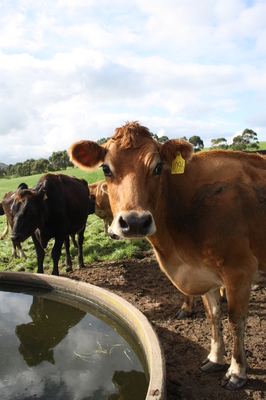GIPPSDAIRY will meet with farmers to determine what action needs to be taken to assist the industry if seasonal conditions worsen.
Recent high temperatures have combined with lower than average rainfall to quickly dry-out soils and add weight to concerns over an impending El Nino affect.
GippsDairy interim executive officer Maree McPherson said a meeting in South Gippsland would be the first formal opportunity for farmers to express their concerns about the current situation.
“We will be calling this meeting soon because farms in the southern coastal areas are among those already feeling the effects of the dry conditions,” she said.
“All along the coast we are hearing reports of dry conditions and concerns over water security so we need to move on this as soon as possible.
“We are also investigating the situation around Yarram and will determine if we need a meeting with farmers there as well.”
Ms McPherson said further meetings would be rolled out across Gippsland if conditions start to worsen.
In the meantime, she urged farmers to access the resources of Dairy Australia which has prepared information packs about coping with tough seasonal conditions or call GippsDairy for assistance in finding appropriate advice.
“GippsDairy and Dairy Australia are there to help farmers when they are struggling to deal with the impact of climatic conditions,” she said.
“Resources are already available offering advice on the best way to move forward in a season like this.”
Farm consultants contacted by GippsDairy said conditions vary significantly across the region but all farmers are feeling some level of pressure.
Some of the key advice offered by the consultants includes:
Conserve as much silage as possible – as a rule of thumb dryland farms need four to five bales per cow.
Paddocks that have already been cut for silage would benefit from the application of a nitrogen blend fertiliser.
Farmers are unlikely to get a second cut of silage and very little hay is likely to be baled if conditions stay dry.
Hay will be available in northern Victoria as many cereal crops will have failed in dry conditions and hence will be baled for hay.
Consider selling passenger cows now while chopper prices are high, about $500 up on this time last year.
Consider using effluent water to grow crops.
If the grass is still green, consider using urea following grazing at 80kg per hectare.
“The strongest message we received from farm consultants was ‘no passengers’,” Ms McPherson said.
“The lower performing cows can’t be carried during a tough year, so now might be the time to sell the poorest milkers.”
Farmers can access information through the Dairy Australia website www.dairyaustralia.com.au or by phoning GippsDairy on 5624 3900.
The Department of Economic Development, Jobs, Transport and Resources (DEDJTR) will also provide weekly updates on conditions via local media.







